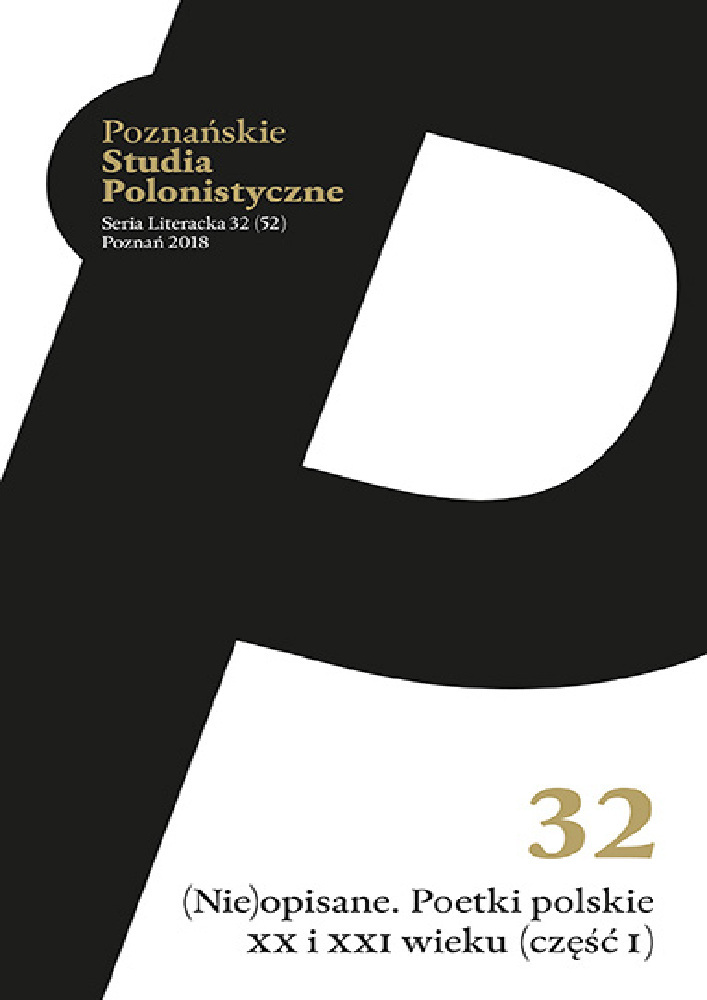Abstract
Jadwiga Stańczakowa was a blind writer, who was more known as a friend of Miron Białoszewski than for her own literary work. Meanwhile, she is the author of several books of poetry, autobiographical prose and a diary. Miron Białoszewski was certainly master for her, thanks to him she began to write about his own blindness. Although that all her work was connected with Białoszewski, it is worth to hear her own voice, especially in the context of disability studies. In this article the author is trying to bring out the poetess of the Białoszewski’s shadows. First of all, the author pointed out that blindness was a magical experience treated as a basis of lirycs. But the dysfunction of sight has also been a cause of recurring depressions. The writing during this ‘double disease’ was particularly difficult and made sense of self-therapy.References
Białoszewski Miron (2010), Chamowo, PIW, Warszawa.
Białoszewski Miron (2012), Tajny dziennik, Znak, Kraków.
Czerska Tatiana (2016), Dzienniki podwójne, czyli o kanibalizmie w diarystyce, w: Autobiografie (po)graniczne, red. Tatiana Czerska, Inga Iwasiów, TAiWPN Universitas, Kraków, s. 183-196.
Poprawa Adam (2015), Posłowie, w: Jadwiga Stańczakowa, Dziennik we dwoje, Warstwy, Wrocław, s. 424-443.
Stańczakowa Jadwiga (1979), Niewidoma, Czytelnik, Warszawa.
Stańczakowa Jadwiga (1982), Ślepak, Czytelnik, Warszawa.
Stańczakowa Jadwiga (1984a), Depresje i wróżby, Czytelnik, Warszawa.
Stańczakowa Jadwiga (1984b), Magia niewidzenia, PIW, Warszawa.
Stańczakowa Jadwiga (1987), Na żywo, Czytelnik, Warszawa.
Stańczakowa Jadwiga (1990), Ziemia-kosmos, Borgis, Warszawa.
Stańczakowa Jadwiga (1991), Kabaret Kizi-Mizi, [nakładem autorki], Warszawa.
Stańczakowa Jadwiga (1992), Kabaret Kizi-Mizi w locie. Rok 1991, Borgis, Warszawa.
Stańczakowa Jadwiga (2015a), Dziennik we dwoje, Warstwy, Wrocław.
Stańczakowa Jadwiga (2015b), Haiku, Warstwy, Wrocław.
Sobolewska Anna, Sobolewska Justyna, Mueller-Liczner Joanna, Kącka Eliza (2015), Stańczakowa sama i z Mironem [skrócony zapis rozmowy] [online], Warszawa [dostęp: 25 listopada 2016], https://kulturaliberalna.pl/2015/09/08/stanczakowa-sama-i-zmironem-skrocony-zapis-rozmowy/.
Śliwa Anna (2016), Białoszewski – atrofie widzenia [online], [dostęp: 25 listopada 2016], http://sensualnosc.bn.org.pl/pl/articles/bialoszewski-atrofie-widzenia-532/.
Walkiewicz Małgorzata (2004), Można być szczęśliwym, w: Trzy portrety. O kobietach radzących sobie z dysfunkcją wzroku, red. Jadwiga Kuczyńska-Kwapisz, Wydawnictwa Akademii Pedagogiki Specjalnej im. Marii Grzegorzewskiej, Warszawa, s. 90-126.
Wiśniak Agnieszka (2008), Pragnienie widzenia. O poezji Jadwigi Stańczakowej, „Episteme”, nr 6, s. 179-188.
Zdanowska Marzena (2017), Nie-złe upośledzenie, „Znak”, nr 740, s. 6-13.
License
Authors
Authors of texts accepted for publication in „Poznańskie Studia Polonistyczne. Seria Literacka” are required to complete, sign and return to the editor's office the Agreement for granting a royalty-free license to works with a commitment to grant a CC sub-license.
Under the agreement, the authors of texts published in „Poznańskie Studia Polonistyczne. Seria Literacka” grant the Adam Mickiewicz University in Poznań a non-exclusive, royalty-free license and authorize the use of Attribution-NoDerivatives 4.0 International (CC BY-ND 4.0)Creative Commons sub-license.
The authors retain the right to continue the free disposal of the work.
Users
Interested Internet users are entitled to use works published in „Poznańskie Studia Polonistyczne. Seria Literacka” since 2016, for non-commercial purposes only, under the following conditions:
- attribution - obligation to provide, together with the distributed work, information about the authorship, title, source (link to the original work, DOI) and the license itself.
- no derivatives - the work must be preserved in its original form, without the author's consent it is not possible to distribute the modified work, such as translations, publications, etc.
Copyrights are reserved for all texts published before 2016.
Miscellaneous
Adam Mickiewicz University in Poznań retains the right to magazines as a whole (layout, graphic form, title, cover design, logo etc.).
